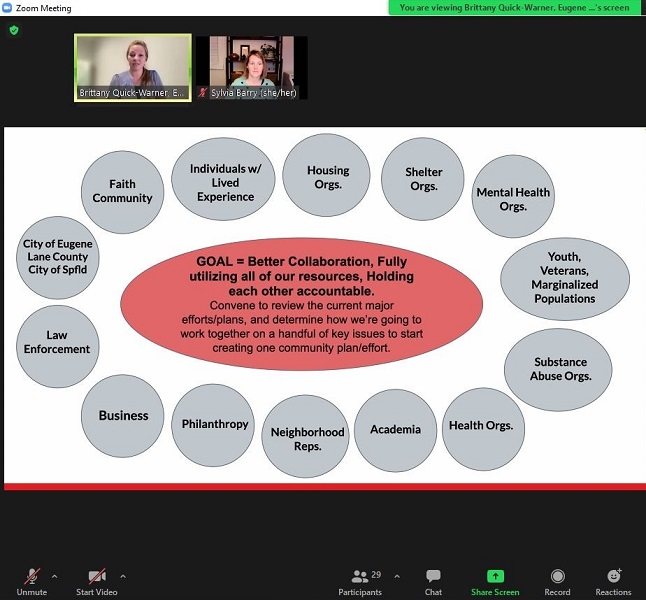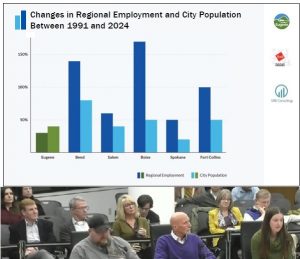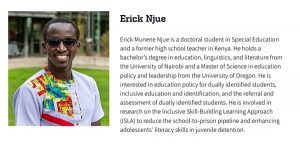Eugene Chamber invites neighborhoods to join business leaders on homelessness
8 min read
Neighborhood leaders should be at the table with business leaders, Chamber President and CEO Brittany Quick-Warner told the NLC in January.
Over 100 area businesses have come together to address homelessness, and the Eugene Chamber of Commerce is inviting neighborhood leaders to get involved.
[00:00:08] Brittany Quick-Warner: I’m Brittany Quick-Warner. I’m the President and CEO at the Eugene Area Chamber of Commerce. We have a membership base of about 1200 businesses who collectively fund the work that we do in the community. We work in advocacy and economic development and then in business services and support.
Thank you for supporting
local citizen journalism
[00:00:25] John Q: The Chamber got involved because it was the number one issue for local businesses.
[00:00:31] Brittany Quick-Warner: We sat down with over 200 individuals to have one-on-one interview-type conversations. There was a time in last spring where I felt like an investigative journalist. I just picked the brain of anyone and everyone who would sit down and talk to me about this issue now, with nearly every nonprofit director who works in this space, businesses, neighbors, city and county staff, unhoused individuals.
[00:00:54] We talked to law enforcement professionals and we talked to communities outside of Eugene to really try and understand what are some of the strategies and the tactics they’re using that are working in some of their communities. We had about 250 pages worth of notes, a lot of information that I really felt like the broader community that don’t get the experience or have the opportunity to sit down and just listen to that many people speak about this issue, and so we wanted to try to summarize that the best that we could.
[00:01:19] We know that homelessness is not going to be solved forever. But what we can do is we can create systems where if someone enters into homelessness, we have a much better system that helps them and get out and exit homelessness as soon as possible and to find the resources they need to try and to achieve wellness whatever that looks like for that individual.
[00:01:37] John Q: Brittany summarized the report’s findings.
[00:01:40] Brittany Quick-Warner: We have individuals living on the streets in our community. And I think that most people who we talk to agree that really isn’t the baseline that we feel we should be accepting as a community. We feel like people in our community should be taken better care of than that.
[00:01:54] The second is, there’s growing crime across this community, and specifically associated with some of these unsanctioned camps. And I want to be really careful in the way we approach this, because I do not want to imply that we think the act of being homeless should be a crime. However, there are some very serious crimes that are being associated and experienced in some of these areas where we do see an increase in unsanctioned camping and honestly, our unhoused individuals are victims of those crimes as well. And I think that that’s a point that gets lost a lot in this community. It’s not just about a business owner or an employee or a neighbor. The unhoused individuals deserve the protection that all the rest of us do as well.
[00:02:34] And the last thing which I almost feel like is a bigger crisis than just the unhoused crisis in general is the fact that we felt a lot of hopelessness. A lot of people we talked to felt hopeless about this issue. Either they thought nothing was happening, they thought what we were doing wasn’t working, or they didn’t know what we were doing.
[00:02:52] John Q: The Chamber embraced its role in research and advocacy, and produced the report with its recommendations. And most importantly, the Chamber issued a call to the community.
[00:03:04] Brittany Quick-Warner: …To organize and convene the business community, so specifically, our constituency: Our business owners, business leaders, employees who really want to engage in this conversation. This is the area I feel like we have the most potential in this community, is if we bring more voices to the table, there’s more opportunities for innovation to occur and new ideas to be brought that maybe haven’t been pursued in the past.
[00:03:24] John Q: Brittany shared the report’s eight recommendations.
[00:03:27] Brittany Quick-Warner: So the first one is quality data. We definitely heard from individuals that the data that we currently have, while much better than what we had in the past, still has so much room to improve. And specifically, we need all of the organizations who are participating in our homeless service network to be contributing to the data that we’re collecting so we can have an accurate picture.
[00:03:49] The second is shared goals to me, this one is huge. When I talked to these 200 people, I would tell you about 199 of the times, there was a different idea of what our end goal was. And if you’re a problem solver, if you’re into doing any kind of research about like sticky goals or sticky issues, one of the first things you have to identify is, ‘What’s your shared goal? What can we all agree?’ This is what we’re trying to achieve together.
[00:04:12] And a huge thing that we found is there is a definite feeling of the city and the county have been the leaders on this issue for better or for worse. And then the service providers are right there with them, but that’s it. And it’s stopped at them. And we think that in some cases that’s how they want it. They want to take the lead in that conversation. But I also think that this is an issue that’s bigger than what our city and county and service providers can solve on their own. And I really think it’s an issue that the entire community has got to come together and say, we need a standard that we’re going to set here locally. And we’re all going to pursue these goals together.
[00:04:49] Service provider capacity. We heard from so many of our nonprofits, man, they’re facing a really really difficult workforce situation right now. It is challenging for them to keep employees. The wages are significantly less than what someone doing the work that they have to do day in and day out should be, benefits, et cetera…. How do we make it more effective for service providers to serve with funding streams that hold them accountable, but then also support their employees.
[00:05:16] Fourth, emergency shelter and permanent housing. Historically there’s been this challenge in communities about how much energy and time and effort and resources should go into shelter and how much should go into permanent supportive housing, because the reality is, like, we need housing to solve the unhoused problem.
[00:05:33] So number five is case management and outreach. Lots of folks doing a lot more coordination needs to be had so we’re not duplicating efforts. And so people don’t have to talk to 10 people before they can get one service that they’re looking for. We need our outreach and case management to be better coordinated to serve these individuals.
[00:05:52] The sixth is wraparound services. We cannot just put individuals in shelter and then end the conversation. If we really want to get those individuals to a path of wellness, we’ve got to figure out how we support their other needs, their health needs, their workforce needs, their mental health and physical health.
[00:06:09] Enforcement accountability. Again, this is one that, is not popular with everyone, but it is absolutely something that we heard over and over again. We really feel like our community has taken this culture of caring and compassion and taking it to the extent where we’re tolerating. And we’ve got to shift from this culture of tolerance to accountability. I’m okay being the city in the country that gets the most people on a path to wellness. I’m not okay but being the city and the community in the country that allows people to come here and to live on the streets with no repercussions for their illegal activities.
[00:06:45] The last is rebuilding community trust and all of this kind of comes back full circle to this idea of, How do we rebuild hope and help the community better trust the institution and the individuals who are trying to do this work? I think that requires way better communication. It requires transparency. It requires accountability for our elected officials and our city officials and county. And it’s necessary to do all of this to rebuild that hope that I think has been lost in so many of our neighbors and neighborhoods and areas in the community.
[00:07:16] John Q: Brittany talked about the business leaders task force.
[00:07:19] Brittany Quick-Warner: We were expecting a dozen people to step up. We have over a hundred businesses who’ve said I want to be a part of that. And they’ve shown up month after month. We have subcommittees that we’re trying to cross-populate with different parts of the community. We’re digging into the data issue. We’re talking about communications and publicly how we get the word out better to the broader community. We have a committee looking at accountability and enforcement. And workforce development, how can we create programs to help those who are unhoused, who are capable and willing and able to work, get them into employment more effectively.
[00:07:50] So if you’re interested, you’re absolutely welcome. We’d love to have some neighborhood representatives there.
[00:07:55] John Q: She said neighborhood leaders are needed, along with many others.
[00:07:59] Brittany Quick-Warner: We really believe that we need to convene a strategic group of community partners, individuals from cross-sector: government, business, nonprofit, neighborhood associations, healthcare individuals with lived experience who are currently unhoused, and I don’t know that I want it to be led necessarily or convened solely by the city and county. We want this to be an opportunity for the community to convene this conversation with the government partners at the table as equals, to set a stage where we can say, ‘Look, we got to do this differently. And what are we going to do as a community to right the ship?’ Because I think that if we don’t, we’re at a tipping point where it could very easily go the other direction.
[00:08:41] John Q: To get involved, contact your neighborhood association or the Eugene Chamber of Commerce.




